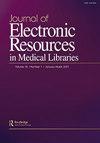之后是什么:健康科学图书馆的破坏和关怀
Q2 Social Sciences
Journal of Electronic Resources in Medical Libraries
Pub Date : 2021-07-03
DOI:10.1080/15424065.2021.1959477
引用次数: 0
摘要
作为一所公共机构的大学健康科学图书管理员,我在过去的一年里目睹了很多事情,我被锁在家里,几乎完全通过电脑屏幕与人交流。虽然向在家工作的过渡具有破坏性,但这只是众多干扰因素中的一个:大流行本身、医疗保健系统、错误信息、政治动荡和极端天气条件。与此同时,我也面临着不断的压力,要为学生和员工寻找获取健康科学信息的新途径,寻找流入机构的新资金来源,寻找帮助人们理解我们已经提供的信息源的新方法,从而“打乱”我自己的工作。在这篇专栏文章中,我想解释一下这些中断,以及它们之间的相互作用如何表明了一种更广泛的文化强调,即迫使图书馆工作人员用越来越少的资源取得更大的成功。我首先介绍了复杂系统理论,作为理解破坏的一种手段。其次,我建立了破坏影响我们这些从事健康科学电子资源工作的人的不同方式。最后,我考虑了为了取得更大成功而施加的组织压力是如何与自我培养对立的,以及我们如何开发新的抵抗途径来保护和照顾我们自己和我们周围的人。本文章由计算机程序翻译,如有差异,请以英文原文为准。
What Comes after: Disruption and Care in Health Science Librarianship
Abstract As a university health science librarian at a public institution, I witnessed much of this past year from the sidelines, locked in my home, and communicating almost entirely through a computer screen. Although the transition to at-home work was disruptive, it was only a single source of disruption among many: the pandemic itself, healthcare systems, misinformation, political turmoil, and extreme weather conditions. At the same time, I was faced with the constant pressure to “disrupt” my own work by finding new pathways for students and employees to access health science information, new sources of money flowing into the institution, and new methods to helping people make sense of the information sources we already provide. In this column, I want to make sense of these many disruptions and how the interplay between them is indicative of a wider cultural emphasis on pressuring library workers to achieve greater success with increasingly fewer resources. I begin with an introduction to complex systems theory as a means of making sense of disruption. Second, I establish the different ways that disruption affects those of us working with health science e-resources. Finally, I consider how organizational pressure to achieve greater success is antithetical to self-nurture, and how we can develop new avenues of resistance to preserve and care for ourselves and those around us.
求助全文
通过发布文献求助,成功后即可免费获取论文全文。
去求助
来源期刊

Journal of Electronic Resources in Medical Libraries
Social Sciences-Library and Information Sciences
CiteScore
0.70
自引率
0.00%
发文量
18
期刊介绍:
The Journal of Electronic Resources in Medical Libraries is a peer-reviewed professional journal devoted to the access, evaluation, and management of electronic resources in the medical library environment. This journal will be an essential resource for academic medical school libraries, hospital libraries, and other health sciences libraries. The material in the Journal of Electronic Resources in Medical Libraries will complement articles published in Medical Reference Services Quarterly (also edited by M. Sandra Wood), which highlights the reference and bibliographic instruction aspects of electronic resources.
 求助内容:
求助内容: 应助结果提醒方式:
应助结果提醒方式:


